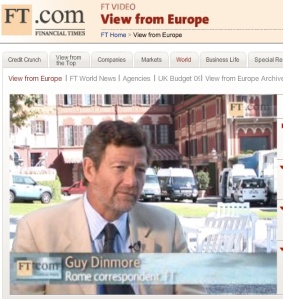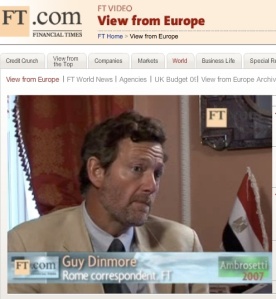Archive
Italy vow paves way for Libya investment
By Guy Dinmore in Rome and Heba Saleh
Published: September 1 2008
Italy’s pledge to pay Libya compensation for its colonial rule paves the way for further Italian investments, such as in energy and infrastructure, but raises uncomfortable issues for former colonial powers in Africa.
In a tent outside Benghazi on Saturday, Silvio Berlusconi, Italy’s centre-right prime minister, returned a headless statue of Venus carted away by Italians decades ago and signed a friendship pact with Muammer Gaddafi, the Libyan leader.
Finmeccanica: Oil powers fuel confidence of Italian conglomerate
By Guy Dinmore
Soaring commodity prices and falling incomes have hit many Italian companies but for Finmeccanica – the defence-aeronautics-rail-power-plants conglomerate – oil-rich states offer expanding markets while the US remains a constant in big weapons spending. Read more…
Rome denies involvement with Iran coup plot
By Guy Dinmore in Rome
Italy’s centre-right government has rejected allegations contained in a US Senate report that Italian and Pentagon officials held secret meetings in Rome in 2001 and heard proposals from Iranian dissidents to overthrow the regime in Tehran.
Papal visit highlights abortion in US poll year
By Daniel Dombey, Andrew Ward and Guy Dinmore
Abortion is one of the most incendiary themes in US politics, and the Roman Catholic Church has taken an increasingly tough line in the debate.
The issue may be particularly resonant in states such as Florida, Michigan, Pennsylvania and Ohio, where the Democrats have found it hard to win over key blue-collar Catholics in the past.
Iran has to take into account the Arab interest in Iraq (video)
 Iran has to take into account the Arab interest in Iraq, says secretary-general of the Arab League
Iran has to take into account the Arab interest in Iraq, says secretary-general of the Arab League
Amr Moussa, secretary-general of the Arab League, tells Gu Dinmore the only aim for all players in Iraq now should be “to clear up the mess” for the sake of the country
Egypt’s PM says US is central to “testing the will” of Israel (video)
 Ahmed Nazif, Egyptian prime minister, says forthcoming Israeli-Palestinian talks must produce concrete results this time
Ahmed Nazif, Egyptian prime minister, says forthcoming Israeli-Palestinian talks must produce concrete results this time
Backlash Feared to U.S. Funding in Iran
by Najmeh Bozorgmehr and Guy Dinmore
The Financial Times
June 15, 2007
The survival of Iranian non-governmental organisations is being threatened by the US administration’s continuing attempts to fund the country’s civil society, leading activists have warned. Prominent NGOs say the US funding, and Iranian suspicions that the money is designed to create the conditions for a “soft revolution”, have helped President Mahmoud Ahmadi-Nejad justify a crackdown on their activities.
The recent arrests of four Iranian-American dual citizens – two on charges of espionage – have sharpened what was already a fierce debate in Tehran and Washington on whether the lack of transparency in identifying the recipients of US funding makes local activists vulnerable to action by the regime. The US State Department denies any of the four had funding from its programme.
US under fire over Afghan poppy plan
by Guy Dinmore in Washington and Rachel Morarjee in Kabul
Published: May 25 2007
The US is proceeding with plans for a big crop-spraying programme to destroy opium poppies in Afghanistan, in spite of resistance from the government of President Hamid Karzai and objections from some senior US military officers who fear it will fuel the Taliban insurgency.
A US delegation will soon leave for Kabul to persuade Mr Karzai that glycophate, a herbicide that is widely applied by US farmers, is safe to use and that trial ground-spraying should begin for the first time since the US ousted the Taliban regime in 2001.
But controversy over the proposed spraying is causing rifts within the Nato alliance. Some governments, including Germany, want nothing to do with the eradication programme and are threatening to reconsider their posture in Afghanistan, diplomats say. Afghan security forces trained by Dyncorp, a private US defence contractor, are to carry out the spraying. Read more…
General Wesley Clark – Legitimacy: First Task for American Security
…….
questions:
Guy Dinmore: Thank you very much General. It’s very nice to see you. I don’t know if you remember but I was actually the FT correspondent in Belgrade in those days in ’99…
GENERAL WESLEY CLARK: Thank you.
Guy Dinmore: …and occasionally we used to chat over the phone with the General in preparing for the bombardment and me in Belgrade also preparing.
GENERAL WESLEY CLARK: Sorry to have interrupted your tea time a couple of times there.
Guy Dinmore: Um, this question of legitimacy is a very complicated subject and I’m going to ramble slightly, then I’m going to ask a very hard question at the end so wait for the punchline. But first of all on Milosevic, I remember there was actually no UN resolution when NATO started bombing Serbia. In that sense there was a lack of, you might call, international community legitimacy. I mean, it did follow later, but it was not there. Um, I think Milosevic is an interesting example. I mean Milosevic, like Saddam, eventually went on trial for war crimes and they were the losers. Um, you have enumerated a list of what a lot of people would count as crimes in this administration’s conduct of the Iraq war. You’ve accused them of deliberately, um, distorting intelligence, leading this country to war under false, um, premises, breaking international laws. You have called for justice. And there is one single act that this country could do which would actually restore its legitimacy, whatever that is exactly in the eyes of the international community. Quite simply, and I will get on to that in a moment…a few weeks ago, Dennis Kucinich was here and he spoke very eloquently. Um, he’s a man who is trying to impeach Dick Cheney but we all know that this is not really the American way, is it? The American way is that a president comes in, like Gerald Ford, and he pardons his predecessor. The American way, on the whole, as we will probably see with Paul Wolfowitz at the World Bank, is ask the man to quietly go and then give him a large sum of money. So, General, if you were the president, and you come to office, would you pardon Mr. Cheney and Mr. Bush for their actions or would you put them on trial for war crimes? Thank you.
GENERAL WESLEY CLARK: Well, I could hardly stand the suspense as you went through the thing. And you have sort of approached it from different…let me just answer a question you didn’t ask first and then I’ll come to the question you did.
Guy Dinmore: No, no, no, no, no…
GENERAL WESLEY CLARK: I want to make…I want to be very clear because I’m asked this occasionally, especially by some of my friends in the Tory party in the UK. They say ‘well look, I mean, here you are citing all these things about Iraq, but you went to war in Kosovo without a UN resolution’ and I want to take just a second and say that the two cases are exactly the opposite. In Kosovo, there was every effort made for diplomacy first. We used force only as a last resort. We used minimum force. We gradually escalated it only when it was clear that minimum force wouldn’t work. We were scrupulously careful to try to avoid civilian casualties. We fully accounted for the civilian casualties that occurred and when the fighting was over, we rushed in a force that already had plans and did everything it possibly could to protect property and they’re still there today guarding these Serb monasteries and other things. So it’s exactly the opposite of the case of Iraq.
Now, with respect to the consequences for those who led the nation.
I think that…I think that it’s premature to talk about these kinds of issues – impeachments and pardon. But I don’t think it’s premature to call for a thorough inquiry and I think that is the American way. We have something here which simply can’t be washed away and covered up. I’ve met with too many parents who’ve lost their children. I’ve met with too many foreign leaders whose faith in America has been damaged. I’ve met with too many military leaders who are struggling to come to terms with what they felt were the pressures and orders from above and what they knew in their hearts and had reservations about as a consequence and tried to resolve it.
This doesn’t…this is not an issue that’s going to go away so I think it needs to be followed step-by-step and I think the way to begin is to first finish the Senate investigation that was promised on whether or not the administration properly used the intelligence information that was available. No point in having everybody write his own memoirs on it – we’ve just had George come out with his – and…let’s get the facts out. We have a Congress in place that is not of the same party as the executive branch in the American system. That normally means that you could provide greater trust and reliance on the adversarial system of inquiry that’s in place.
Let’s have it…let’s have it done. And then let’s go back and find out about those memos written in the Executive branch. What exactly did they mean when they said…when they say the Geneva Convention was an anachronism, when they redefined the definition of torture, when they indicated that…what was going through the Secretary of Defense’s mind when he was talking about how we needed more information, not more people in Iraq? And what did he think that meant to the people on the ground? Where did the abuses at Abu Ghraib come from? What are the secret findings that are out there in the intelligence community? Why are these rumors still surfacing of people being beaten up and abused and conduct that’s just not…and what did the President in a signing statement in the 2006 Act on Military Commissions and the 2005 Act on detainee treatment? What have been the actual consequences of those signing statements?
These are legitimate matters of public inquiry and in our political system, we have a lot of people in office who do have political courage and I have confidence that our leaders will ask these tough questions because it’s the only way we can move our country forward and regain the trust and good faith of others in the world.
US rules out direct talks with Iran
by Guy Dinmore in Washington and Gareth Smyth in Tehran
Financial Times Published: March 1, 2007
The Bush administration on Wednesday dismissed suggestions that it might engage directly with Iran or Syria at an international conference on Iraq to be held in Baghdad next week.
European allies and domestic critics have broadly welcomed the announcement by Condoleezza Rice, the secretary of state, that the US would take part in the conference alongside Iran and Syria. She also noted that such a diplomatic initiative had been recommended by the bipartisan Iraq Study Group last year. Ms Rice’s statement at a Senate hearing on Tuesday prompted reports in the US media of a dramatic shift in policy. It was fuelled in part by the State Department, which pointedly declined to rule out the possibility of bilateral talks between Ms Rice and Iranian officials at a follow-up conference on Iraq to be held in April.
But on Wednesday the White House stepped in to “clarify” the situation and explicitly ruled out such a move.
Read more…